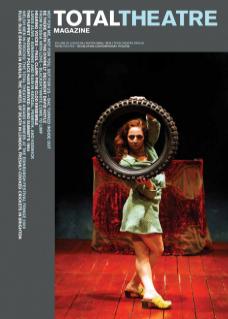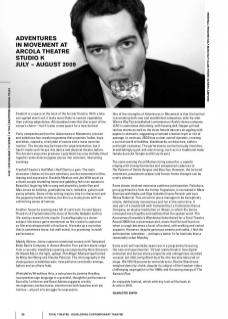Studio K is a space at the back of the Arcola Theatre. With a blue corrugated steel roof, it looks more likely to contain vegetables than cutting-edge dance. Aficionados know that this is part of the venue’s charm—but it’s also a new space for a new festival.
Forty companies perform for Adventures in Movement, a broad and ambitious four-week programme that promises ‘ballet, boys and bikes, capoeira, a fairytale of swans and a mass exercise routine’. The Arcola may be known for experimentation, but it hasn’t made such forays into dance and physical theatre before. The Arcola’s executive producer Leyla Nazli has now skilfully fitted together some diverse jigsaw pieces into coherent, interesting evenings.
Freefall Theatre’s Half Man / Half Clam is a gem. The main character chokes on his own emotions, but the movement is lithe, teasing and expressive. Danielle Meehan and Joe Wild excel as a drunk couple stumbling home and gobbling fish in an aquarium. Beautiful, lingering folk is sung and played by Jamie Doe and Max Jones on kalimba, gramophone horn, melodica, guitars and penny whistle. Some of the writing may be trite (in character) and the puppetry harder to follow, but this is a lovely piece with an unflinching sense of humour.
Another favourite evening was full of contrasts. Curved Space Theatre’s 3 Crystals takes the story of Dorothy Hodgkin and her life-saving research into insulin. Crystallography is a clever subject: the dance gains momentum as the crystal is captured on film and released with a final burst. It breaks up a narrative that is sometimes linear, but well acted, in a promising ‘scratch’ performance.
Maddy Wynne-Jones captures emotional nuance with Tempered Body Dance Company in Amuse Bouche. Four perfect duets range from a raunchy, breathless opening accompanied by Nina Simone’s He Needs Me, to the light, upbeat This Magic Moment (performed by Ming-Hei Wong and Claudia Palazzo). The choreography in the closing piece is kaleidoscopic: new patterns constantly emerge, before and as others fade.
(Prelude) by Wreckless Arts, a solo piece by Jemima Hoadley, incorporates sign language in a graceful, thoughtful performance. Sound by La Horrox and Rossi Adams suggests crackly microphones, techno beats, interference with bassline and raw tinnitus – all part of a struggle for expression.
One of the strengths of Adventures in Movement is that the festival is promoting both new and established companies, side-by-side. Wanna Play? by established contemporary Arabic dance company IJAD is sometimes disturbing, with teasing doll, flapper girl and techno moves as well as the three female dancers struggling with apples in skinsuits, suggesting a twisted creation myth or rite of passage. In contrast, 2B3D has a clear overall dynamic, creating a surreal world of bubbles, skateboards, architecture, antlers and bright costumes. The performance can be furiously inventive, breathtakingly quick and also moving, such as in a traditional male/ female duet (Ali Temple and Kirsty Green).
The same evening Vocal Motions bring powerful, a capella singing with strong harmonies and unexpected cadences to The Passion of Saints Sergius and Bacchus. However, the tortured movement, passionate subject and freeze-frame changes can be overly intense.
Some shows involved extensive audience participation. Fiskultura, group gymnastics from the former Yugoslavia, is recreated in Mass Exercise with Nadia and Olga Sokolski (Ivana Peranic and Lara Ritosa Roberts). This eccentric piece manages to be deceptively simple, deliberately monotonous and fun at the same time. It was part of a double bill with Vulnerasti by Lo Commotion Dance Company, an elusive meditation on illness, in which the dance conveyed more fragility and subtlety than the spoken word. The Anonymous Ensemble’s Wanderlust (shortlisted for a Total Theatre Award 2008) has a picaresque plot, music that fits well (such as when a cough becomes a burst of techno), stilt-walking and varied puppetry. However, despite generous sweets and vodka, I find the participation relentless – perhaps a better fit for festivals than a reasonably sober Monday.
Some work will inevitably seem raw in a programme favouring the new and experimental. ‘Virtual reality theatre’ (live digital animation and dance) about prosperity and unhappiness sounded unusual, but (No) Living Room by al’Ka-mie became laboured on stage. We Will Overcome by writer/director Charlie Shand was weighed down by cliché, despite its subject of the freedom riders challenging segregation in the 1960s and the young energy of The Kamichi Plan.
An enjoyable festival, which with any luck will be back at Arcola in 2010.

